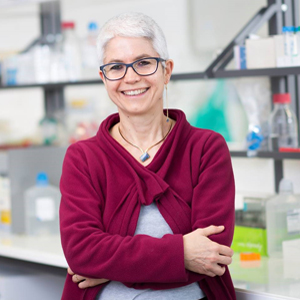MGMT methylation levels predicting treatment response
Fast facts
- Official title: MGMT methylation score for predicting benefit from TMZ in patients with IDHmt low grade glioma to guide treatment decisions
- Lead researcher: Professor Monika Hegi
- Where: Lausanne University Hospital, Switzerland
- When: January 2020 – December 2021
- Cost: £134,000
- Research type: Adult, Low Grade (Astrocytoma and Oligodendroglioma), Clinical, Biomarkers
- Grant round: Clinical biomarkers
What is it?
In this project, the researchers will be working to find a biomarker for IDH-mutated low grade gliomas (LGGs). They want to predict which people will get the most, and the least, benefit from temozolomide (TMZ) chemotherapy. They propose that with this knowledge, some treatments, such as radiotherapy, could be reduced or delayed, avoiding side-effects and improving quality of life.
TMZ works by damaging a cell’s DNA so much that the cell dies. MGMT is a protein that repairs the damage caused by TMZ, which cancels the treatment effect of the drug.
In up to 90% of the LGGs with IDH mutation, the MGMT is turned off to some degree by a DNA change called ‘methylation’. Methylation causes the MGMT to become ineffective, and may mean tumours are more sensitive to TMZ treatment.
The degree of methylation can be assessed as high, medium and low. But we don’t know (yet) what level of MGMT methylation is needed for a change in treatment response.
In a European clinical trial, some people treated with TMZ did significantly better if their tumour showed high MGMT-methylation, compared to those whose tumours had no or low MGMT-methylation.
The researchers will use the information and samples they gathered during this trial and conduct experiments to gain a deeper understanding of these results.
All participants have been treated only with TMZ after surgery. Tumour samples from the initial surgery will be analysed for the level of MGMT-methylation using two different techniques (methylation chip technology and a quantitative pyrosequencing assay). Samples will then be divided into groups based on the level of methylation and tumour growth will be assessed using their clinical information, including imaging results.
The trial participant samples will provide the initial ‘test’ group. These results will be validated using samples from 120 individuals who weren’t on the trial.
A validated biomarker would provide evidence-based information to guide treatment decisions in alignment with the patients’ priorities.
Professor Monika Hegi
Why is it important?
Researchers aren’t sure how best to use MGMT-methylation information, but it could serve as a biomarker for predicting how effective treatment will be. This study could propose the level of MGMT-methylation that can be used to predict the effectiveness of TMZ. If a good response to TMZ is predicted then there would be less need to use radiation therapy. This means the adverse, potentially long-term side effects could be avoided, improving quality of life.
While this research will be based in Switzerland, the team includes clinicians in the UK too. So, a positive result for this project can be quickly implemented in the UK and around the world.
Who will it help?
This study aims to help people diagnosed with a low grade glioma (with IDH mutation) and their families.
A validated biomarker scoring-system would help people make decisions, especially if they want to delay or avoid aggressive radiotherapy after surgery. Their score may indicate potential risks, which would be particularly helpful for patients with a long prognosis, or who have large tumours that would normally require a lot of radiotherapy.
Milestones
Achieved
- Professor Hegi and her team recruited 110 patients with IDH mutant low-grade gliomas who have been treated with TMZ following surgery.
- Tumour samples and MRI scans have been collected from 95 of these individuals which will be used to generate a MGMT methylation score.
- Tumour tissue archived in the Tumour bank has now been analysed for genome-wide DNA methylation.
Upcoming
- Specialists are currently finalising the review of the clinical information of the participants, including magnetic resonance-images (MRI). This will allow the experience of the participants (i.e. response to treatment) and the score of the MGMT biomarker to be correlated. This is an important step for validation and future implementation as “tool” to guide treatment decisions.
If you have any questions about this, or any of our other research projects, please contact us on [email protected]
Research is just one other way your regular gift can make a difference
Research is the only way we will discover kinder, more effective treatments and, ultimately, stamp out brain tumours – for good! However, brain tumours are complex and research in to them takes a great deal of time and money.
Across the UK, over 100,000 families are facing the overwhelming diagnosis of a brain tumour and it is only through the generosity of people like you can we continue to help them.
But, by setting up a regular gift – as little as £2 per month – you can ensure that families no longer face this destructive disease.
In this section

Prof Monika Hegi
Professor Monika Hegi is the director of the Laboratory of Tumour Biology and Genetics within the Department of Clinical Neuroscience